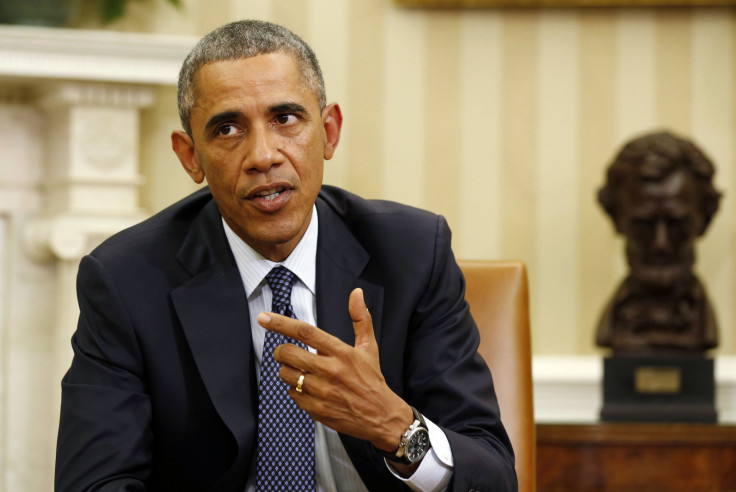Ebola In US Not An 'Epidemic' Or 'Outbreak,' Says Obama [VIDEO]

The incidence of Ebola virus disease in the U.S. constitutes neither an “epidemic” nor an “outbreak,” President Barack Obama said in his weekly address Saturday, when he urged the public to be “guided by the science.” Obama’s message comes after the diagnoses of the first U.S. Ebola cases to be contracted outside West Africa. Texas Health Presbyterian Hospital nurses Nina Pham and Amber Joy Vinson each contracted the disease while treating Thomas Eric Duncan, who died from Ebola.
“[W]hat we’re seeing now is not an ‘outbreak’ or an ‘epidemic’ of Ebola in America. We’re a nation of more than 300 million people. To date, we’ve seen three cases of Ebola diagnosed here -- [Duncan,] the man who contracted the disease in Liberia, came here and sadly died; [and] the two courageous nurses who were infected while they were treating him. Our thoughts and our prayers are with them, and we’re doing everything we can to give them the best care possible. Now, even one infection is too many. At the same time, we have to keep this in perspective. As our public-health experts point out, every year thousands of Americans die from the flu,” Obama said in his address.
The president discussed the difficulty of getting infected with Ebola, saying a person has to be in direct contact with the body fluids of another person already showing symptoms of the disease. He also mentioned he himself was feeling fine after having “met and hugged some of the doctors and nurses who’ve treated Ebola patients.” Among them was Kent Brantly, a physician who contracted the disease in Liberia and was subsequently cured.
Obama also outlined increased federal efforts to fight Ebola. They encompass additional Centers for Disease Control and Prevention personnel on the ground in Dallas and Cleveland; the creation of Ebola rapid-response teams at the CDC; and the recently instituted airport screenings.
White House Press Secretary Josh Earnest likened each of the new Ebola rapid-response teams to a SWAT team. “The team would provide in-person, expert support and training on infection control, health-care safety, medical treatment, contact tracing, waste and decontamination, public education and other issues," Earnest said in a question-and-answer piece published Friday.
Obama said there are no plans to ban air travel to and from West Africa, citing the health and safety concerns such a travel restriction would cause. “Trying to seal off an entire region of the world -- if that were even possible -- could actually make the situation worse. It would make it harder to move health workers and supplies back and forth,” he said. Banning air travel also could make it harder for officials to track the disease because it might make people more likely to find alternate travel routes or to lie during airport screenings.
Vinson are currently being treated at Emory University Hospital in Atlanta, the same hospital that treated Brantly and Nancy Writebol. A second, unnamed Ebola patient is also being treated at the hospital. Pham is being treated at a National Institutes of Health in Maryland. A freelance NBC News cameraman, Ashoka Mukpo, is being treated at the Nebraska Medical Center in Omaha. Nurses and others who may have come into contact with Duncan at Texas Health Presbyterian Hospital are being monitored.
Vinson traveled commercially after contracting the disease, and the CDC is monitoring passengers on her flights between Dallas and Cleveland. A third person who came into contact with Duncan is currently quarantined on a Carnival Cruise Lines ship.
© Copyright IBTimes 2025. All rights reserved.






















